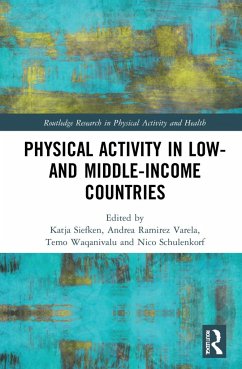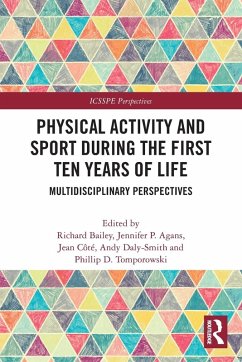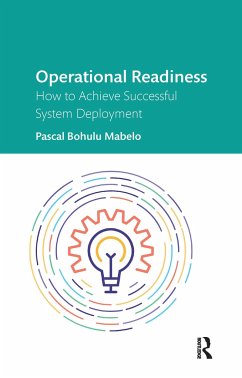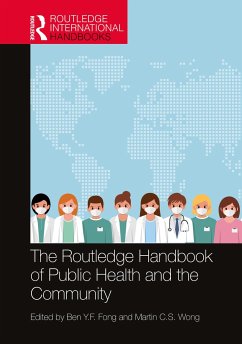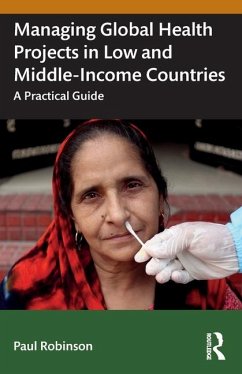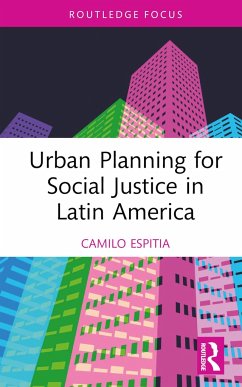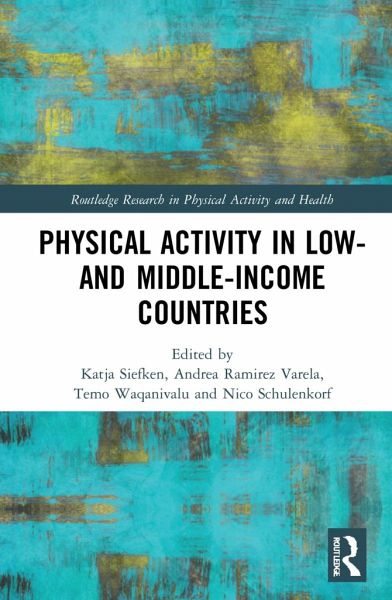
Physical Activity in Low- and Middle-Income Countries

PAYBACK Punkte
23 °P sammeln!
This book critically evaluates the complex relations between physical activity, health imperatives and cultural and social opportunities in low- and middle-income countries (LMICs).The book explores the uncertainty of knowledge around physical activity behavior and its distinctive meanings in LMIC contexts, the factors influencing physical activity, and how populations across the world understand and live the concept of physical activity. It discusses the key challenges and opportunities for sustaining physical activity within geographically and culturally diverse contexts of LMICs; introduces...
This book critically evaluates the complex relations between physical activity, health imperatives and cultural and social opportunities in low- and middle-income countries (LMICs).
The book explores the uncertainty of knowledge around physical activity behavior and its distinctive meanings in LMIC contexts, the factors influencing physical activity, and how populations across the world understand and live the concept of physical activity. It discusses the key challenges and opportunities for sustaining physical activity within geographically and culturally diverse contexts of LMICs; introduces the reader to contemporary global physical activity approaches, models and policies; and presents case studies from around the world, including Asia, Africa, South America, the Pacific and Europe. Overall, the text relates theory to practical examples to facilitate a better understanding of physical activity in context, emphasizes the need for targeted, context-specific and locally relevant interventions to create PA-enabling environments in LMICs, and highlights the role of a range of stakeholders, including policy makers and urban planners, sport and recreation services, mass media, educators and the civil society in shaping population physical activity levels. Taken together, this edited volume brings together the latest research on PA in LMICs from around the world, informs and directs future research and necessary policy change towards the sustainable integration of PA opportunities, and seeks to ultimately foster and promote population-based PA in LMIC settings.
By presenting empirical data and policy recommendations, this text will appeal to scholars, researchers and practitioners with an interest in physical activity research, public health, health promotion, sociology of sport, and sports sciences in LMICs, as well as policy makers and experts working in health promotion, public health, sports and fitness, but also in the urban planning and infrastructure and governmental industries.
The book explores the uncertainty of knowledge around physical activity behavior and its distinctive meanings in LMIC contexts, the factors influencing physical activity, and how populations across the world understand and live the concept of physical activity. It discusses the key challenges and opportunities for sustaining physical activity within geographically and culturally diverse contexts of LMICs; introduces the reader to contemporary global physical activity approaches, models and policies; and presents case studies from around the world, including Asia, Africa, South America, the Pacific and Europe. Overall, the text relates theory to practical examples to facilitate a better understanding of physical activity in context, emphasizes the need for targeted, context-specific and locally relevant interventions to create PA-enabling environments in LMICs, and highlights the role of a range of stakeholders, including policy makers and urban planners, sport and recreation services, mass media, educators and the civil society in shaping population physical activity levels. Taken together, this edited volume brings together the latest research on PA in LMICs from around the world, informs and directs future research and necessary policy change towards the sustainable integration of PA opportunities, and seeks to ultimately foster and promote population-based PA in LMIC settings.
By presenting empirical data and policy recommendations, this text will appeal to scholars, researchers and practitioners with an interest in physical activity research, public health, health promotion, sociology of sport, and sports sciences in LMICs, as well as policy makers and experts working in health promotion, public health, sports and fitness, but also in the urban planning and infrastructure and governmental industries.





